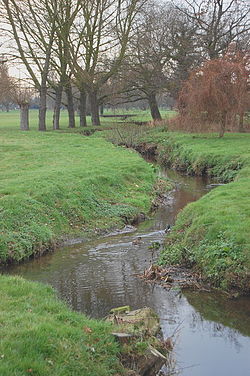| Roach | |
|---|---|
 River Roach flowing through Rochford Hundred Golf Course | |
| Location | |
| Country | England |
| County | Essex |
| Physical characteristics | |
| Source | |
| • location | Rayleigh |
| • coordinates | 51°35′50″N 0°37′56″E / 51.5973°N 0.6322°E |
| • elevation | 58 m (190 ft) |
| Mouth | River Crouch |
• location | east of Wallasea Island |
• coordinates | 51°37′00″N 0°52′18″E / 51.6166°N 0.8718°E |
• elevation | 0 m (0 ft) |
| Length | 22 km (14 mi) |
| Basin features | |
| River system | River Crouch |
| Designation | |
| Official name | Crouch & Roach Estuaries |
| Designated | 24 March 1995 |
| Reference no. | 721[1] |
River Roach | ||||||||||||||||||||||||||||||||||||||||||||||||||||||||||||||||||||||||||||||||||||||||||||||||||||||||||||||||||||||||||||||||||||||||||||||||||||||||||||||||||||||||||||||||||||||
|---|---|---|---|---|---|---|---|---|---|---|---|---|---|---|---|---|---|---|---|---|---|---|---|---|---|---|---|---|---|---|---|---|---|---|---|---|---|---|---|---|---|---|---|---|---|---|---|---|---|---|---|---|---|---|---|---|---|---|---|---|---|---|---|---|---|---|---|---|---|---|---|---|---|---|---|---|---|---|---|---|---|---|---|---|---|---|---|---|---|---|---|---|---|---|---|---|---|---|---|---|---|---|---|---|---|---|---|---|---|---|---|---|---|---|---|---|---|---|---|---|---|---|---|---|---|---|---|---|---|---|---|---|---|---|---|---|---|---|---|---|---|---|---|---|---|---|---|---|---|---|---|---|---|---|---|---|---|---|---|---|---|---|---|---|---|---|---|---|---|---|---|---|---|---|---|---|---|---|---|---|---|---|
| ||||||||||||||||||||||||||||||||||||||||||||||||||||||||||||||||||||||||||||||||||||||||||||||||||||||||||||||||||||||||||||||||||||||||||||||||||||||||||||||||||||||||||||||||||||||
The River Roach is a river that flows entirely through the English county of Essex. It is one of four main streams that originate in the Rayleigh Hills to the west, and flow east. They then flow towards the centre of the Rochford Basin, a circular feature which may have been caused by an asteroid impact in the Late Oligocene or Early Miocene periods. To the east of Rochford, the river becomes tidal, and is governed by the Crouch Harbour Authority. It joins the River Crouch between Wallasea Island and Foulness Island. To the west of Rochford, there is some doubt as to which of the four streams is officially the Roach.
At Stambridge, there was a tidal mill from at least the 1500s, although few details are known until it was rebuilt in 1809. A pound was filled by the incoming tide, and was released to drive a water wheel as the tide fell. On spring tides, this gave around 7 hours of operation, which gradually decreased as the tides reduced, and at neap tides, the operation of the mill was entirely dependent on the flow from the upper river. Rankins, the millers, objected to plans by the Great Eastern Railway to build a dam and reservoirs in Rochford, as it would damage their operation, but a single reservoir was authorised in 1904.
The river channels are designated as "heavily modified" from their natural state by the Environment Agency, who measure the water quality. This is moderate for most of the tributaries, and the chemical status has improved since 2013. Charles Darwin's HMS Beagle was moored on the river from 1850 as a Coast Guard watch ship. It was sold for breaking, but an archaeological survey concluded in 2008 that much of it still remains buried beneath the mud near Paglesham. The Paglesham Reach is also significant for its native oysters.
- ^ "Crouch & Roach Estuaries". Ramsar Sites Information Service. Retrieved 25 April 2018.
